- Home
- Marie Rutkoski
The Hollow Heart Page 3
The Hollow Heart Read online
Page 3
I deserve beauty, and I shall have it.
What Morah and Annin see in my face, or think of me, I neither know nor care. I push past them, out of the bedroom and down the stairs, whistling to my bird, which swoops from the rafters to my shoulder. The jewels make my ears throb. The bird’s talons grip my shoulders as I dive into the warm dusk of the street in search of Aden and the rest of my god-blooded soldiers.
* * *
The High Kith come at nightfall. Weapons bristling, they enter the Ward through the wall’s gate.
Aden sets their skin aflame, roasting them inside their armor. Rinah, whose garden I once tended, its abundance surprising, the sun melons always unusually large and honeyed, steps forward. She teases indi vines, those pretty weeds that lattice the entire city, into snaking ropes that bind the invaders.
The wall the High Kith built to contain us also protects us. The High Kith and their Middling militia pour through the gate as thickly as they can, but it is a narrow entrance. They cannot enter the Ward in great enough force to overwhelm the god-blooded Half Kith. Not Aden, lighting their bodies into torches, nor Rinah, nor that little boy whose father had brought him to me, Sithin, who is gifted with making holes. Black space appears in living flesh. He makes skin pop with empty buttons, riddling the skin like a disease.
When most of our enemies have been captured, killed, or subdued, I step through the wall’s gate into the Middling quarter to face the rest of the horde. “You were so tired.” The power of my gift curls into my lovely voice. “You wanted to fall asleep.” The trick to controlling people with my god-power is to present them with my version of the past. A memory might not kill a man, but I can push false memories into a weak brain. The High Kith are used to nothing standing between them and their pleasure. The Middlings, who serve the High Kith, are used to obedience. What resistance can they possibly raise against me? I make them remember a sleepiness they do not feel. One by one, they drop unconscious at my feet.
All my life, the people of Ethin lived as instructed, the Half Kith behind the wall built to contain them and the gifts they didn’t even know they had. The High Kith lived diamond lives, clear and glittering, as they threw wild parties in their lavish homes and consumed whatever they wanted: wriggling rainbow fish, clouds of pink cream on airy cake, and our god-blood, watered down and served as a tasteless elixir in teacups so fine you could see lamplight through their creamy porcelain. Our blood was their delight: a little burst of magic on the tongue so that the High Kith, at least for a few hours, reveled in borrowed glory. They floated inches off the ground. Their faces shifted into more beautiful lines. Rainwater trailed from their shoulders in a veil. Lightning traced crowns above their brows.
How many of the High Kith understood what they did? How many knew that they drank the blood of the people they most despised, and how many believed the elixir was an innocent delight offered to them by the Council, a drink made from fruit or a flower, perhaps? Maybe some suspected the pink elixir had an unpleasant origin, yet did not seek its source, because to know and drink would then be wrong, and they wanted the taste of magic without the bitterness of guilt.
Their life was sweetly blessed. They had everything they wanted. Days of endless luxury. I, who had a taste of sweetness with Sid, understand why the High Kith never sought to learn whether they deserved what they had. I once feared that if I considered too closely why Sid wanted me, I might discover that her attention would never truly be mine, that I didn’t deserve it, or that it would be wrong to keep it.
Do you not love me like I love you? she asked. My perfect memory, a gift and a curse, makes me hear again the fear in her voice, and feel again my devastation to hear her ask that question at the moment of abandoning me.
The god of thieves has done me a favor. I desire Sid still, but I cannot feel my love for her. I feel love for no one, not even my people.
This is a good thing. Love is a problem. It blurs your sight, and stands in the way of what needs to be done. If I listened now to the love I once had for Morah and Annin, their kindhearted worries might trouble me. Instead, I tell my Half Kith to bind our sleeping enemies and carry them to prison. Morah and Annin might stay my hand as I reach for Rinah’s shoulder. “Tear down the wall,” I order her. “Use the indi vines.”
Rinah hesitates. The wall is too familiar, the most important element of our lives from birth. It stood the whole of our parents’ lives, and their parents’ lives, encircling the Half Kith for centuries. When I lived with Sid in the High quarter I sometimes missed the wall for its reliable, calm strength. The wall corrals us, but it also creates our home.
“Do it, Rinah, for your children. Remember how you feared they would be snatched away in the night. Remember how as they grew old enough to play in the streets, you dreaded that they might break one of the High Kith’s many rules, and be taken to prison, and come home with a missing limb, or weak from blood loss. Think of the world you want for them instead.”
Rinah’s face contorts. Indi vines thicken to the width of a burly man’s arm. Their green darkens to near black. They knot together and wedge into tiny pockmarks in the wall’s granite. Vegetal fingers dig into rock, then disappear, driving into stone like worms into earth. Rinah watches vines split the granite. The wall begins to crumble, dust sifting down. Rubble spills loudly from the cracks, hissing and thumping to the ground. With a thunderous crack, the wall breaks, pieces heaving down in chunks.
From the scattered debris, dust rises like smoke.
“Good,” I tell Rinah, who looks stricken and angry and glad.
“I suppose our days of forging and selling passports are over,” Aden says, “now that the wall is gone.”
I do not like his poor attempt at jovial familiarity, and at leaning on our history together so that he might share—or perhaps eventually control—the authority I now possess over this city. I do not like his smug expression, as if this is his victory, when he simply obeyed my command. It was I who foresaw how this clash would go, I who knew how to use my god-soldiers to strike. Aden is convenient to me for his power and popularity, but he is sorely mistaken if he thinks I have forgotten how he wished to control me with his so-called love, how he blamed me when I wanted someone else. He shamed me for wanting Sid. What a tiny-minded man, to construe my choice as shameful, simply because I did not choose him.
Let him watch his step. He lives only because I allow it.
“I never sold passports,” I tell him. “I made them to give away. To help.” How naïve I was! How easy it was for Raven, whom I loved like a mother, to manipulate me, feeding me sugary stories about the good we were doing for others. With the passports I forged, people trapped behind the wall could pretend to be Middling and escape. And they did … at a cost I never suspected. Raven made them give her all they had. She enriched herself, padding a home in the Middling quarter with luxuries. I—meek, trusting—had never guessed. I needed her love so much that I made myself believe she was the good person she pretended to be.
I am finished with love.
Aden must see some of my thoughts in my face. “You have changed.”
“Good.”
“You used to be kind, Nirrim. Gentle. I liked you better before.”
“Of course. I was easier for you to use.”
Aden’s expression twitches with genuine hurt. “All I wanted was to make you happy. Tell me how, and I will do it.”
“Make plans for public trials of the High Kith,” I say, “and mass executions. We shall tithe them as they once tithed us. Ten percent of all High-Kith adults shall be culled from the prison to pay the price for their people’s sins. Sharpen an ax, Aden. That will me very happy indeed.”
SID
WHEN WE REACH HERRAN’S BAY, a feeling as resonant as song fills my chest. I have not once felt homesick since I ran away, but now that I am back, homesickness floods me, belated. It is strange to feel longing for something just when I am about to get it, and when I had decided I didn’t want it. Longing
thickens inside me, as though deriving its sudden strength from coming so late, so far after the fact.
Herran’s mountainous coast is lush with trees. Once the jewel in the Valorian Empire’s crown, the city grows out of the rocky cliffs that hug the bay. The newest homes, built after the war my parents won, are painted in soft pastels with bright blue shutters that must be shut when autumn comes and green storms riot up the coast. Nirrim’s island was summery, with odd bursts of icy wind that would last for a few days only, but my country has its seasons, and although the laran trees now hold their leaves like thick, green shawls, and all I smell is the sea’s brine, I know autumn is not far off. Soon, it will be Ninarrith, when my people light a hundred candles in honor of the last day the gods walked among us. I always thought the holiday a pleasant fantasy, an excuse for giving gifts, but after what I saw on Nirrim’s island, I wonder. I went searching for magic, and magic I found, but what was its source? Whatever her people could conjure was fleeting, thin, like rivulets from a nearly dry creek bed that cannot quench anyone’s thirst.
Nirrim, though, had something more. Deeper.
I try not to think about her. I think about the weather, as a true sailor would, for her life depends on it. I think about how the coming of autumn smells like honey and a lit match.
It smells like Nirrim’s hair, when I buried my face in it. My throat closes. For a moment I cannot see, my vision blurred. Then it clears.
A tall, broad figure waits at the pier. The shape of my father is instantly familiar.
I shouldn’t have hoped that the arrival of our two ships—Roshar’s an obvious Dacran vessel, skinny and long and flying his green flag, and mine one of the finest in my father’s fleet, which I commandeered the night I left Herran—would go unnoticed. A fool’s hope.
Perhaps I should be glad that my father hasn’t appeared with his entire guard. A small mercy. At least my prodigal return home isn’t public gossip. Yet.
Roshar rests a hand on my shoulder. “Best to face him sooner rather than later, princess.”
“Best you kiss my ass, prince.”
His hand tightens. “Don’t apologize to him for running away.” Surprised, I turn to him. He adds, “Never apologize for who you are or what you needed to do to be yourself.”
I almost believe my godfather. My eyes almost prickle with relieved gratitude. Even when I was small, I longed to have his self-possession, his easy-seeming way of flouting expectation. Of demanding people meet him on his terms, not theirs. I wanted this even though—or because—I knew nothing was easy for him. He shares his true feelings with few people. His mutilations keep them at bay. He has done things for which he will never forgive himself. So yes, the words sound like something he would mean. But as we disembark, I decide Roshar’s advice is a pretty-sounding lie. Be myself? Don’t apologize? I am supposed to marry Roshar’s sister’s son and inherit the realms of Herran and Dacra. He knows this. He helped arrange it. He might say understanding things—and he, who likes men just as I like women, understands me better than most—but he would never break my betrothal.
When we meet my father, the king, on the pier, he places his palm on Roshar’s cheek, and Roshar does the same: the traditional Herrani greeting between men who are friends or family. I cannot look away from this gesture, this closeness between them. I am filled with envy.
My father’s hair turned silver, they say, at my birth, so frightened was he to lose my mother, who had bled too much and was close to death. He lowers his gray eyes to meet mine. I have some of his height, but not nearly enough. He towers above people, his arms stony with muscle. His skin, a few shades darker than mine, the same light brown as Nirrim’s, is weathered by sun and wind and age, save for the shine of a long scar that cuts down from his brow and into the hollow of his left cheek. He does not wait to let me speak. He pulls me to him.
“God of life,” he says. “I thought I would lose you, too.” He holds me as if I were a child. Despite what Roshar advised, I instantly apologize, my face pressed against my father’s chest. Water seeps from my eyes into his linen tunic. “Etta,” I say, “forgive me.”
He tells me there is nothing to forgive, that I am here now. “My girl. I was so worried. Why did you leave us?”
I cannot answer. I don’t want to blame my mother, whom he loves so fiercely. I don’t want to blame him for not protecting me from her schemes, and ignoring them. I want, for once, to be a good daughter. So I give him my silence. It is the best I can offer. He accepts it, as I knew he would. He, who was enslaved from the time he was a child until he was a young man, never likes to force an answer.
What could I say? You expected too much from me. I chose to put my pleasure first. You are an apple, Sidarine.
What I’m truly sorry for, what makes the tears still come, is that choosing myself meant hurting him, and I did it anyway. I cannot promise I won’t do it again. I am sorry for my guilt—and my anger. When I saw my father greet Roshar, anger rushed into me like a wind-fed flame, because my father will never place his hand on my cheek like that. He will never greet me the way Herrani men do. I am his only child, his beloved daughter—a girl, not his equal. I am not a man.
* * *
My father doesn’t like the trappings of his stature. Arin the Plain King, people call him with pride. They love him and his simple clothes, his quiet manner. My mother, with her hive of spies, is fully aware that the way he presents himself to Herran only encourages the other name people call him: Death’s Child. Death, after all, needs no velvet or silk to remind you of his strength. He announces his presence with a mere tap on the shoulder.
My mother told me, People believe that your father survived the war because he was born in the year of the god of death. He is god-touched, they say. The god of death loves him.
What do you believe? I asked. My father worships the gods. He lights candles in their temple. My mother, whose features are practically a song for the fallen Valorian Empire and its many crimes, her skin honey-colored, her hair woven gold, has no religion. The Valorians believed in no god but their own strength. Infidels, the Herrani call them. Murderers. The Valorians deserved their destruction, they say.
I, for one, agree.
My mother said carefully, I believe it is important for the people to believe Arin is Death’s Child.
Because it makes it easier for you to rule them, I said, my tone rude.
My mother’s light brown eyes narrowed. No, she said. Because it makes them hopeful, and fear the future less.
As I follow my father and Roshar on horseback through the city, which still bears the scars of the last war before my birth, when Herran overthrew the Valorians and my mother murdered her emperor, I remember how I had wanted to point out that the Herrani’s love for my father exempted my mother from their long-held hate against anything Valorian. How could they even stand to look at her, when her people had enslaved this country, when three decades before my birth, Kestrel’s own father had brutally crushed the Herrani? How convenient for you, I wanted to say, that they adore Etta.
How convenient for you, she might have replied, leveling me with one of her perfectly aimed comments that I have seen strike home in other people.
There is no hiding that I look like her. I used to hope my blond hair would darken with age. I searched my face for traces of my father, but nothing will change my Valorian features. Still, I don’t like to be reminded, and I definitely did not need to be reminded by my mother. She is too keenly aware of the vulnerabilities of others, and on that day we discussed my father, chosen by Death, I feared saying something that would make her be cruel to me. While not a cruel person, she has a gift for knowing what hurts most. She used to show her love by never turning that gift against me.
* * *
My home is no palace, despite our royal titles, but rather an elegant villa, smaller than many of the enormous, marble-columned Valorian mansions from the decade-long colonial era. Sunlight splashes through trees that canopy horse paths leadin
g out of the city’s center. The three of us, my father and Roshar side by side, and I behind, ride into the green tunnels created by trees and bushes, cicadas whirring in the branches, to the house that was his as a child, before it was stolen by the Empire. He reclaimed it during the Firstwinter Rebellion, when Herrani slaves rose up against their masters. He once even kept my Valorian mother prisoner within the villa’s east wing.
I ran to my mother on small, bare feet when I learned this, the marble tiles slick and cool against my soles. Even then, I hated pinching lady slippers. In a shocked voice, I announced, Etta captured you.
She frowned. Where did you hear that? she asked.
He locked you up.
Who told you?
Worried I’d get my nurse in trouble, but more worried I’d get myself in trouble, I confessed: Emmah.
Emmah cannot know the whole story, my mother said.
What is the whole story?
Emmah has no right to chatter gossip to my child. It is not her tale to tell.
Tell me.
When you are older. It is not a tale for little ones.
I am old enough for Needles, I said, referring to the set of deadly knives she was training me to wield. Though she had no natural gift for weapons, she had worked for years to be skilled at Needles.
She smoothed flyaway hair off my brow. Yes, he imprisoned me, but I imprisoned him first. Do not worry, tadpole. He is mine, and I am his. Always.
The grounds surrounding my home are still green with summer’s end, pomegranates heavy and dark fists on their low trees. My father’s orange grove has been harvested.
“Did you eat them all?” Roshar asks my father, nodding at the grove. My father’s love for the fruit is legendary. Really, everything about my parents is.
My father allows Roshar a small smile. “Almost.”
“And left none for your dearest, most charming friend, I bet. Well, Arin. You know what this means. Not a drop of my finest Dacran liquor for you later when we listen to young Sid regale us with all the fun she has had breaking foreign hearts.”

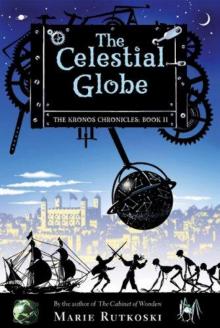 The Celestial Globe
The Celestial Globe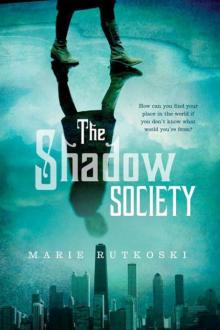 The Shadow Society
The Shadow Society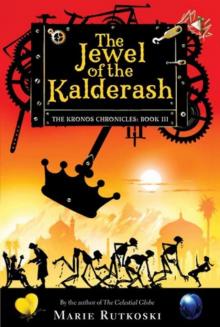 The Jewel of the Kalderash
The Jewel of the Kalderash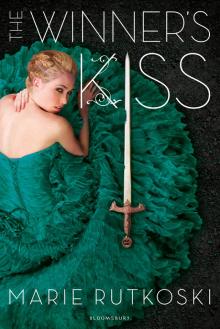 The Winner's Kiss
The Winner's Kiss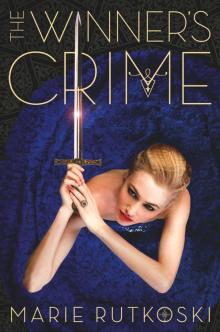 The Winner's Crime
The Winner's Crime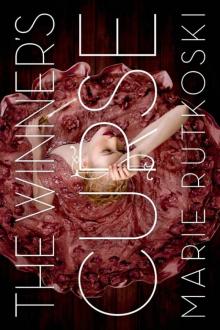 The Winner's Curse
The Winner's Curse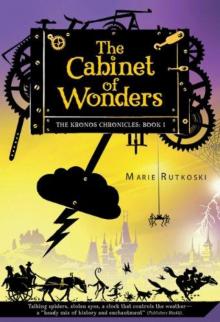 The Cabinet of Wonders
The Cabinet of Wonders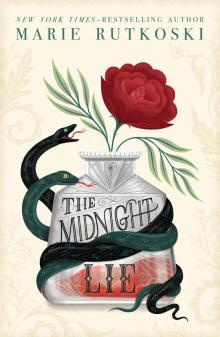 The Midnight Lie
The Midnight Lie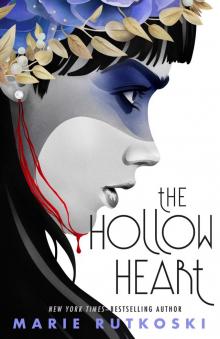 The Hollow Heart
The Hollow Heart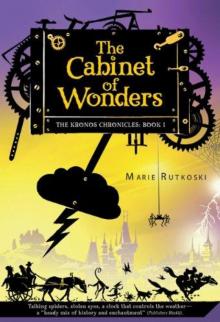 The Cabinet of Wonders: The Kronos Chronicles: Book I
The Cabinet of Wonders: The Kronos Chronicles: Book I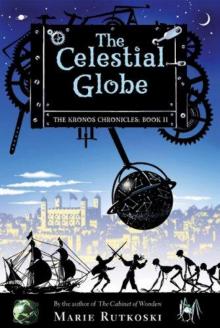 The Celestial Globe: The Kronos Chronicles: Book II
The Celestial Globe: The Kronos Chronicles: Book II